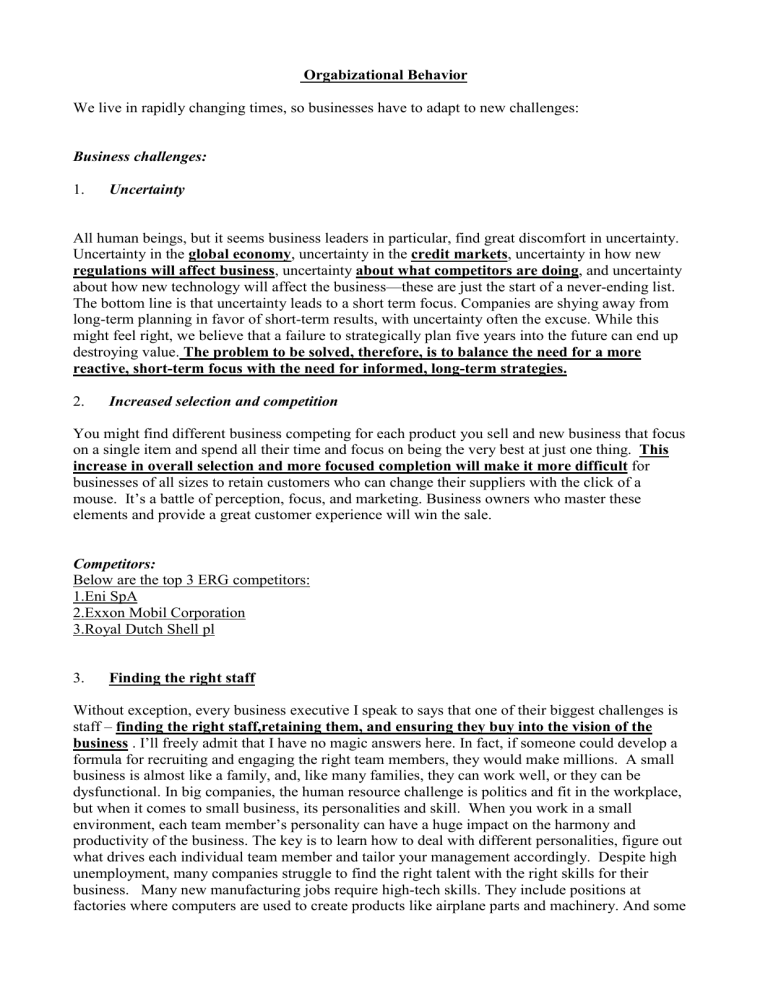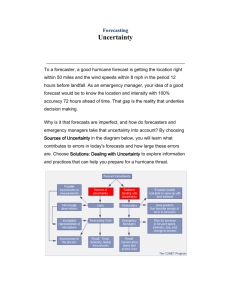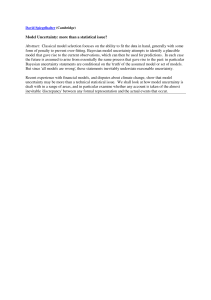
Orgabizational Behavior We live in rapidly changing times, so businesses have to adapt to new challenges: Business challenges: 1. Uncertainty All human beings, but it seems business leaders in particular, find great discomfort in uncertainty. Uncertainty in the global economy, uncertainty in the credit markets, uncertainty in how new regulations will affect business, uncertainty about what competitors are doing, and uncertainty about how new technology will affect the business—these are just the start of a never-ending list. The bottom line is that uncertainty leads to a short term focus. Companies are shying away from long-term planning in favor of short-term results, with uncertainty often the excuse. While this might feel right, we believe that a failure to strategically plan five years into the future can end up destroying value. The problem to be solved, therefore, is to balance the need for a more reactive, short-term focus with the need for informed, long-term strategies. 2. Increased selection and competition You might find different business competing for each product you sell and new business that focus on a single item and spend all their time and focus on being the very best at just one thing. This increase in overall selection and more focused completion will make it more difficult for businesses of all sizes to retain customers who can change their suppliers with the click of a mouse. It’s a battle of perception, focus, and marketing. Business owners who master these elements and provide a great customer experience will win the sale. Competitors: Below are the top 3 ERG competitors: 1.Eni SpA 2.Exxon Mobil Corporation 3.Royal Dutch Shell pl 3. Finding the right staff Without exception, every business executive I speak to says that one of their biggest challenges is staff – finding the right staff,retaining them, and ensuring they buy into the vision of the business . I’ll freely admit that I have no magic answers here. In fact, if someone could develop a formula for recruiting and engaging the right team members, they would make millions. A small business is almost like a family, and, like many families, they can work well, or they can be dysfunctional. In big companies, the human resource challenge is politics and fit in the workplace, but when it comes to small business, its personalities and skill. When you work in a small environment, each team member’s personality can have a huge impact on the harmony and productivity of the business. The key is to learn how to deal with different personalities, figure out what drives each individual team member and tailor your management accordingly. Despite high unemployment, many companies struggle to find the right talent with the right skills for their business. Many new manufacturing jobs require high-tech skills. They include positions at factories where computers are used to create products like airplane parts and machinery. And some require several years of training. Because of changing technology, businesses are struggling to find qualified workers with IT skills, problem solving abilities, and deductive reasoning skills. Career Development We wanted to look through the career development from the perspective how fast people get promotions but there is no time limitations We aim to develop and maintain the necessary qualification level of managers and specialists through training and development, taking into account modern standards and development prospects. The following steps are taken to achieve the above objectives: Skills Systematic training to refresh theoretical knowledge and practical skills of managers and specialists; acquisition of new knowledge and skills to improve the performance of professional tasks Thinking Development of management and organisational skills, creative and innovative thinking of the Company’s managers and specialists; Culture Providing managers and specialists with training in contemporary production standards and organizational culture. We value our employees’ commitment to delivering results, their willingness to work in a team and to assume responsibility; we attach particular importance to a performance-based incentive system.





